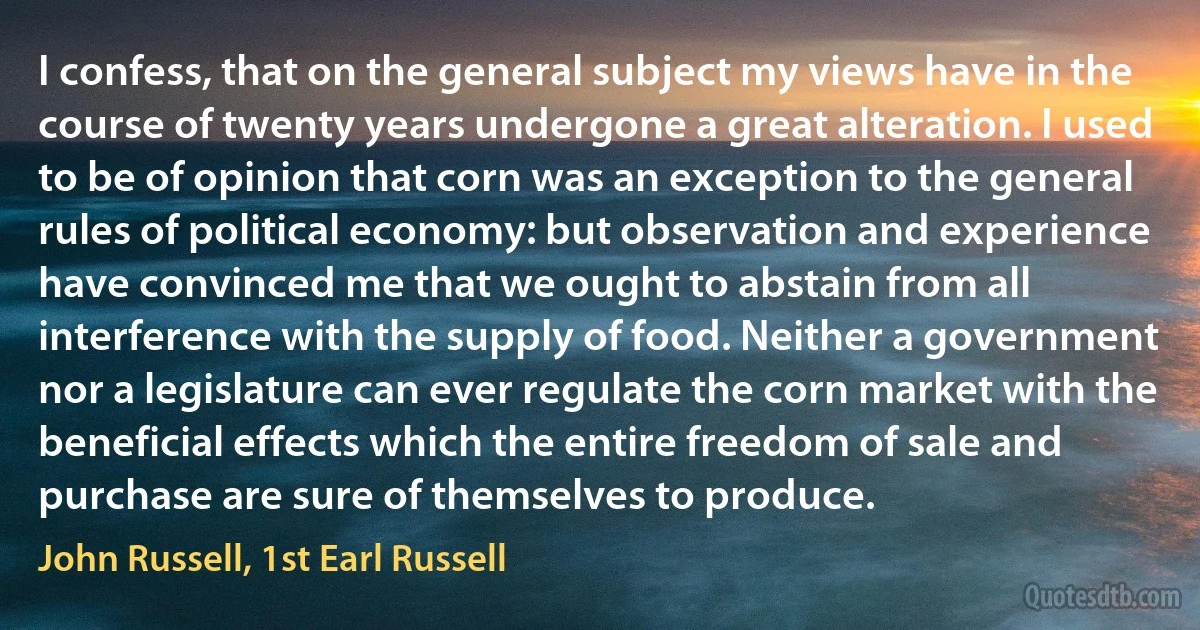Legislature Quotes - page 7
With regard to the construction of statutes according to the intention of the legislature, we must remember that there is an essential difference between the expounding of modern and ancient Acts of Parliament. In early times the legislature used (and I believe it was a wise course to take) to pass laws in general and in few terms; they were left to the Courts of law to be construed so as to reach all the cases within the mischief to be remedied. But in modern times great care has been taken to mention the particular cases in the contemplation of the legislature, and therefore the Courts are not permitted to take the same liberty in construing them as they did in expounding the ancient statutes.

Lloyd Kenyon, 1st Baron Kenyon
Though in a state of society some must have greater luxuries and comforts than others, yet all should have the necessaries of life; and if the poor cannot exist, in vain may the rich look for happiness or prosperity. The legislature is never so well employed as when they look to the interests of those who are at a distance from them in the ranks of society. It is their duty to do so: religion calls for it; humanity calls for it; and if there are hearts who are not awake to either of those feelings, their own interests would dictate it.

Lloyd Kenyon, 1st Baron Kenyon
The Alabama Democratic convention [instructed] its delegates to walk out of the national convention if the party refused to adopt a platform pledging a federal slave code for the territories. Other lower-South Democratic organizations followed suit. In February, Jefferson Davis presented the substance of southern demands to the Senate in resolutions affirming that neither Congress nor a territorial legislature could impair the constitutional right of any citizen of the United States to take his slave property into the common territories.

James M. McPherson
The military forces of a free country may be considered under three general descriptions - 1. The militia. 2. the navy - and 3. the regular troops - and the whole ought ever to be, and understood to be, in strict subordination to the civil authority; and that regular troops, and select corps, ought not to be kept up without evident necessity. Stipulations in the constitution to this effect, are perhaps, too general to be of much service, except merely to impress on the minds of the people and soldiery, that the military ought ever to be subject to the civil authority, &c. But particular attention, and many more definite stipulations, are highly necessary to render the military safe, and yet useful in a free government; and in a federal republic, where the people meet in distinct assemblies, many stipulations are necessary to keep a part from transgressing, which would be unnecessary checks against the whole met in one legislature, in one entire government.

Richard Henry Lee
Then came the Black Hawk war; and I was elected a captain of volunteers, a success which gave me more pleasure than any I have had since. I went the campaign, was elated, ran for the legislature the same year (1832), and was beaten - the only time I ever have been beaten by the people.

Abraham Lincoln
The danger is perhaps not great if the people of one State, through their legislature, decide that Lady Chatterley's Lover goes so far beyond the acceptable standards of candor that it will be deemed offensive and non-sellable, for the State next door is still free to make its own choice. At least we do not have one uniform standard. But the dangers to free thought and expression are truly great if the Federal Government imposes a blanket ban over the Nation on such a book. [...] The fact that the people of one State cannot read some of the works of D. H. Lawrence seems to me, if not wise or desirable, at least acceptable. But that no person in the United States should be allowed to do so seems to me to be intolerable, and violative of both the letter and spirit of the First Amendment.

John Marshall Harlan II
Mr. President, distinguished colleagues, having logged eighteen years of service in the legislature, two years of hard labor in the Cabinet, and helping out in the local government unit of Batangas for nearly nine years on a pro bono capacity, the one I am nominating, Mr. President, today has certainly paid his dues and has earned his right to be promoted for a podium position.

Francis Escudero
If Religion consist in voluntary acts of individuals, singly, or voluntarily associated, and it be proper that public functionaries, as well as their Constituents shd discharge their religious duties, let them like their Constituents, do so at their own expence. How small a contribution from each member of Congs wd suffice for the purpose? How just wd it be in its principle? How noble in its exemplary sacrifice to the genius of the Constitution; and the divine right of conscience? Why should the expence of a religious worship be allowed for the Legislature, be paid by the public, more than that for the Ex. or Judiciary branch of the Govt [?] Were the establishment to be tried by its fruits, are not the daily devotions conducted by these legal Ecclesiastics, already degenerating into a scanty attendance, and a tiresome formality?

James Madison
The Constitution of the United States recognizes the slaves, held within some of the States of the Union, only in their capacity of persons - persons held to labor or service in a State under the laws thereof - persons constituting elements of representation in the popular branch of the National Legislature - persons, the migration or importation of whom should not be prohibited by Congress prior to the year 1808. The Constitution no where recognizes them as property. The words slave and slavery are studiously excluded from the Constitution. Circumlocutions are the fig-leaves under which these parts of the body politic are decently concealed. Slaves, therefore, in the Constitution of the United States are recognized only as persons, enjoying rights and held to the performance of duties.

John Quincy Adams
"No human laws are of any validity if contrary to the law of nature; and such of them as are valid derive all their force and all their authority mediately or immediately from this original.” Thus writes Blackstone, to whom let all honour be given for having so far outseen the ideas of his time; and, indeed, we may say of our time. A good antidote, this, for those political superstitions which so widely prevail. A good check upon that sentiment of power-worship which still misleads us by magnifying the prerogatives of constitutional governments as it once did those of monarchs. Let men learn that a legislature is not "our God upon earth,” though, by the authority they ascribe to it, and the things they expect from it, they would seem to think it is. Let them learn rather that it is an institution serving a purely temporary purpose, whose power, when not stolen, is at the best borrowed.

Herbert Spencer
The right hon. Gentleman has argued, that the adoption of the plan proposed by the Government would confer advantage on the consumer, would increase the revenue, and would give increased scope to the industry of the manufacturer. We, Sir, argue, that with an amount of benefit to the revenue altogether inconsiderable, with a slight, nay an imperceptible relief to the consumer, and with detriment to the sure interests of the British manufacturer, you are asked to abandon what is nothing less than a great principle of humanity, that has received the most solemn sanction of the Legislature, the principle of hostility to the slave-trade and to slavery.

William Ewart Gladstone
Prior to the adoption of the Sistema Central in the Mexican republic, the province of New Mexico was under a territorial government. The executive was called Gefe Politico (political chief), and the Diputacion Provincial very inefficiently supplied the place of a legislature. Under the present system, however, New Mexico being a department, the names of these powers have been changed, but their functions remain very nearly the same. The Gobernador (governor) is appointed by the President for eight years. The legislative power is nominally vested in a Junta Departamental, a kind of state council, with very circumscribed powers, somewhat analogous to, and certainly not more extensive than, those of a board of aldermen with us. But even this shadow of popular representation was 'prorogued' by Gov. Armijo soon after his accession to power (five or six years ago), and has never since been convened; so that its functions have been arbitrarily exercised by the governor ever since.

Josiah Gregg
The right of parliament to legislate for us cannot be accounted for upon any reasonable grounds. The constitution of Great Britain is very properly called a limited monarchy, the people having reserved to themselves a share in the legislature, as a check upon the regal authority, to prevent its degenerating into despotism and tyranny. The very aim and intention of the democratical part, or the house of commons, is to secure the rights of the people. Its very being depends upon those rights. Its whole power is derived from them, and must be terminated by them.

Alexander Hamilton
Sir, if I look to the prerogative of the Crown-if I look to the position of the Church-if I look to the influence of the aristocracy-I cannot charge myself with having taken any course inconsistent with Conservative principles, calculated to endanger the privileges of any branch of the Legislature, or of any institutions of the country. My earnest wish has been, during my tenure of power, to impress the people of this country with a belief that the Legislature was animated by a sincere desire to frame its legislation upon the principles of equity and justice. I have a strong belief that the greatest object which we or any other Government can contemplate should be to elevate the social condition of that class of the people with whom we are brought into no direct relationship by the exercise of the elective franchise.

Robert Peel



